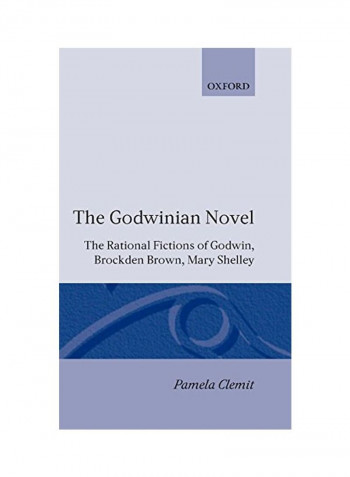The Godwinian Novel: The Rational Fictions Of Godwin, Brockden Brown, Mary Shelley Hardcover
Recommend
Sort by
Rating
Date
Specifications
Author 1
Pamela Clemit
Book Description
The Godwinian Novel is a pioneering analysis of the school of fiction inaugurated by William Godwin, and developed in the works of his principal followers, Charles Brockden Brown and Mary Wollstonecraft Shelley. In the first study of these authors as a historically specific group, Pamela Clemit argues for a greater unity between Godwin's fictional techniques and his radical political philosophy than has been perceived. Her analysis of the works of Brown and Mary Shelley, moreover, reveals how these writers modified, reshaped, and redefined Godwin's distinctive themes and techniques in response to shifting ideological pressures in the post-revolutionary period. Examining prose ficiton in a period traditionally seen as dominated by poetry, Clemit stresses the necessity for a revised view of British Romanticism. Uncovering the links between Godwin's fictional analysis of sujective experience and his progressive political philosophy, The Godwinian Novel paves the way for a reappraisal of the apparently quietistic and introspective concerns of other writers of the period.
ISBN-13
9780198112204
Language
English
Publisher
Oxford University Press
Publication Date
22 Apr 1993
Number of Pages
268
About the Author
Pamela Clemit is Professor of English at Queen Mary University of London and a Supernumerary Fellow at Wolfson College, Oxford. Her other books include The Godwinian Novel (1993), also published by Oxford University Press. She has published a dozen or so scholarly and critical editions of William Godwin's and Mary Shelley's writings, including an Oxford World's Classics edition of Caleb Williams (2009) and The Letters of William Godwin, Volume I: 1778-1797 (2011). She has been a visiting research fellow at the New York Public Library, at All Souls College, Oxford, and at Wadham College, Oxford. In 2016 she was awarded the Keats-Shelley Association of America Distinguished Scholar Award
Editorial Review
a valuable, deeply argued study. * English Studies Vol 75 no 6 * The strength of Clemit's account of the development of a genre is its capacity to acknowledge the complex relations between literary, political and cultural issues in the period. * The Keats-Shelley Review * An intelligent, useful, and suggestive study for students of both American and British fiction of the early nineteenth century. * Nineteenth-Century Literature * 'The question 'Was there a Godwin "school"?' is not the primary focus of this book, but one of the many virtues of Pamela Clemit's intelligent study is that we are, by the end, left in little doubt about the answer. This is a sure and useful book, unfussily written and admirably referenced. It is informative and convincing, and has a strong sense of literary form as well as an enviable grasp of the currents of thought over half a century. As such, Clemit makes a commendable contribution to our knowledge and understanding both of the Godwin circle and of the revolutionary period. * Modern Language Review * '... challenging and enjoyable ...' Robert W. Uphaus. Michigan State University. Eighteenth-Century Fiction 6:3 'Pamela Clemit convincingly makes her case. Her readings of Frankenstein and of The Last Man have the great virtue of insisting on the public resonance of both novels. She makes large claims, but they are well supported. If this book has the influence it deserves, I can look forward to reading a very different set of essays on Frankenstein next year.' Richard Cronin, University of Glasgow. Notes and Queries. Vol 41 No 2 June '94 `to write ably and with little fuss or obvious polemic in an area where factions clash, and still to maintain a clearly discernable thesis with firmness and with concern for the reader's understanding and sympathy is rare ... This innovatory book ably demonstrates relationships between Godwin's fictions and his changing political ideas' Durham University Journal



